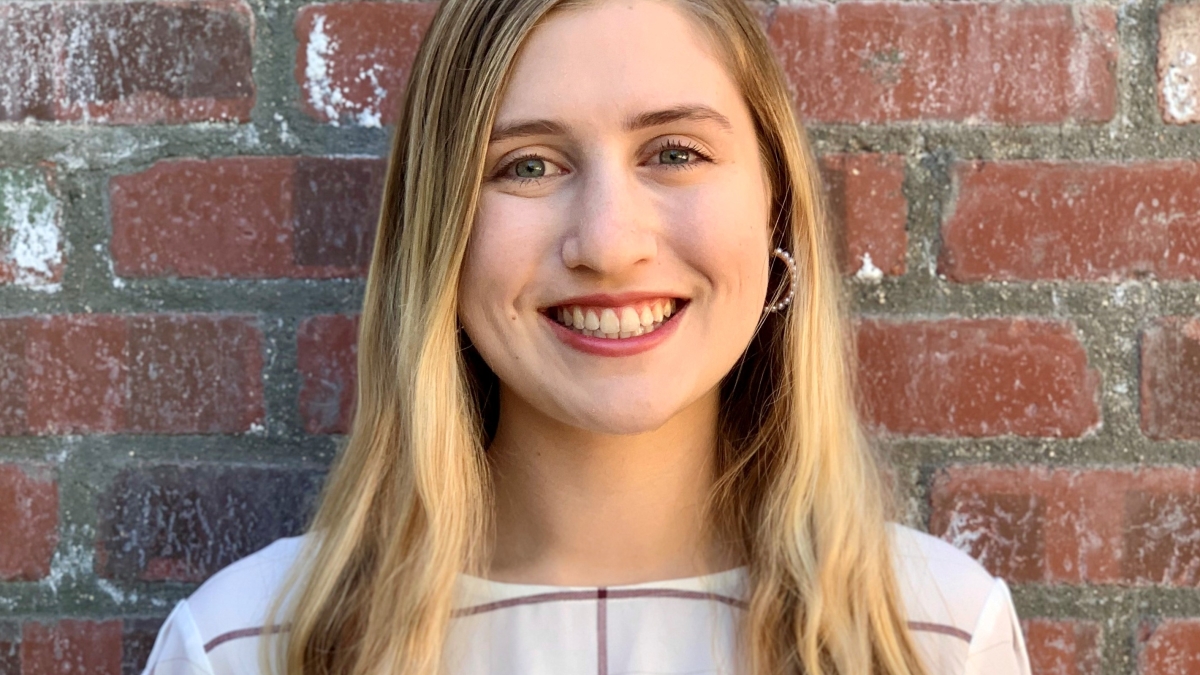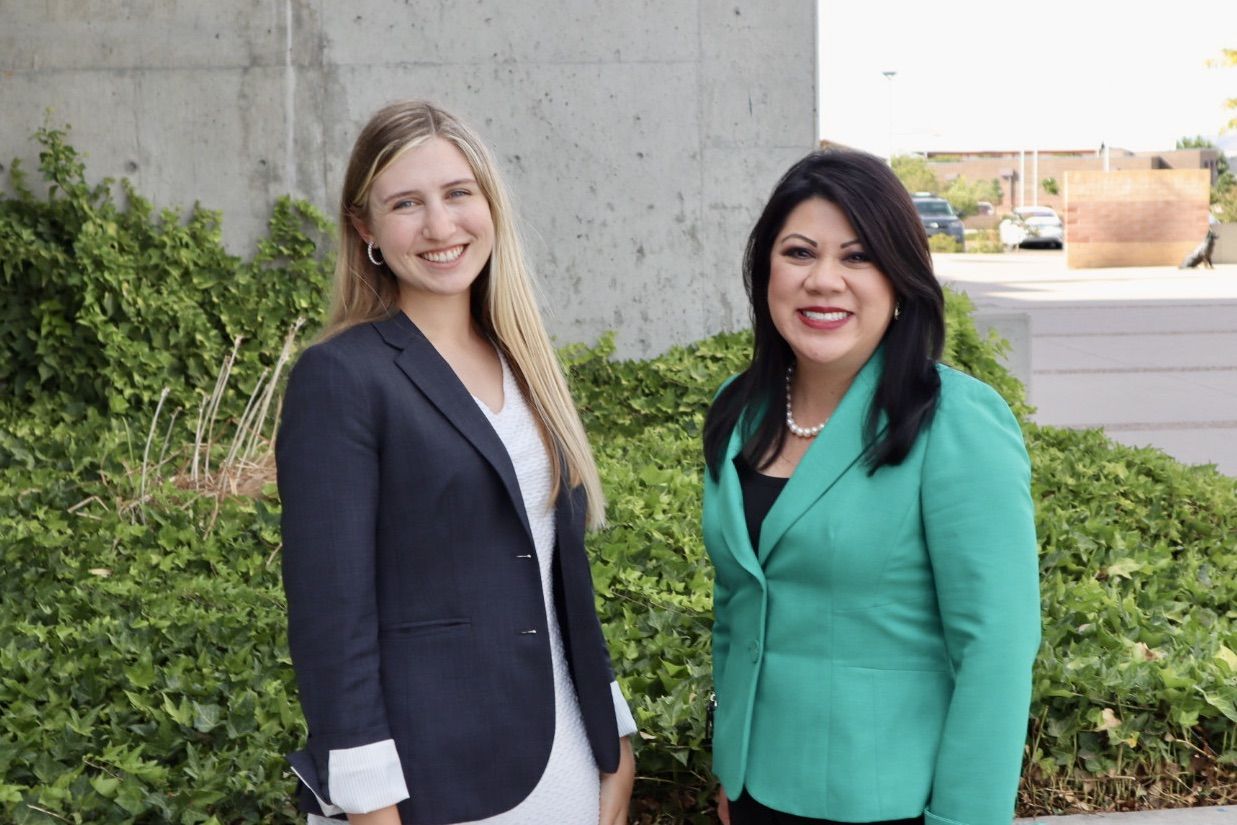Soon-to-be grad already at work as spokesperson for state treasurer's office

Hannah Roehr won’t go full time in her position until she graduates from Arizona State University next week, but she’s already the public information officer, known as a PIO, for one of the state’s top elected officials.
Editor's note: This story is part of a series of profiles of notable fall 2020 graduates.
Part-time jobs, which students often take while finishing school, aren’t usually known for their location at the Arizona State Capitol. Hannah Roehr won’t go full time in her position until she graduates from Arizona State University in December, but she’s already the public information officer, known as a PIO, for one of the state’s top elected officials.
Roehr is a Spirit of Service Scholar, a program administered through the Congressman Ed Pastor Center for Politics and Public Service at the Watts College of Public Service and Community Solutions. Her internship at the Arizona state treasurer’s office had her working for a PIO who was leaving that position and trained Roehr to succeed her.
Roehr will go full time as spokesperson for Treasurer Kimberly Yee – a Watts College graduate with an MPA degree – when Roehr receives a Bachelor of Arts degree in business with an emphasis on public service and public policy from ASU’s W. P. Carey School of Business.
“I was first introduced to Arizona state government and policymaking by being a Senate page at the Arizona State Senate my freshman year at ASU. I met many people involved in Arizona state government through the Senate page program,” Roehr said.
“The former PIO who I connected with at the Arizona State Senate was leaving. She knew I appreciated Treasurer Yee’s work as a public official and would be interested in interning at the Arizona state treasurer’s office. Looking back, I had no idea that the connections that I made as a Senate page would lead me to my current role as the PIO for the Arizona state treasurer.”
PIOs are often people who have worked professionally in public relations or journalism, but even though that’s not her academic background, Roehr said the classes she took at Watts College taught her the important role of public administration and of transparency and accountability in government.
“I learned how important being outwardly focused is,” she said. “I am not only responsible to my boss, I’m responsible to the public.”
The treasurer’s office is responsible for the state’s banking and investment management duties and provides investment services to Arizona’s local governments, according to its website, whose revamping was one of Roehr’s recent accomplishments.
Read on to learn more about Roehr and how her time at ASU helped prepare her for a career in state government:
Question: Tell us a little about yourself today and your early years.
Answer: I am from Prescott, Arizona. I have always been creatively orientated with my hobbies of drawing, graphic design and even music. I will graduate in December 2020 with a bachelor's degree in business (public service and public policy). In my time at ASU, I have interned at the Arizona State Senate; U.S. Rep. Paul Gosar's office in Washington, D.C.; the Arizona governor's office; and the Arizona state treasurer's office.

Hannah Roehr, left, an ASU senior and Spirit of Service Scholar, is the public information officer for Arizona State Treasurer Kimberly Yee, right. Roehr expects to receive a Bachelor of Arts degree in business in December 2020. Photos courtesy of Hannah Roehr
Q: Tell about what are you doing now.
A: I am the public information officer for the Arizona state treasurer's office. Before I started this position, I was their communications intern for over a year. Now, I am the liaison between the treasurer's office and the public, including the media and constituents. By creating content for the office's website and social media, I inform the public about how their taxpayer dollars are being safely invested and managed by the Arizona Treasury. I write press releases, articles and speeches. I attend events with Treasurer Kimberly Yee and coordinate her media interviews. Additionally, I manage the communications and much of the marketing for the AZ 529 Education Savings Program, which is newly housed in the Arizona Treasury. The treasurer's goal and my goal is to reach individuals and families with this financial plan so that they can save for their future higher education.
Q: Tell us about your experience as a Spirit of Service Scholar. How did it prepare you for life after college?
A: My experience as a Spirit of Service Scholar was gratifying and challenging. My fellow scholars and I coordinated two public seminars about free speech on college campuses and another about overcoming trauma through storytelling. These events were a challenge to arrange with bringing in expert speakers, scheduling, marketing and narrowing down the subject matter. I learned many aspects of event planning with these daylong seminars. One of my favorite parts of the Spirit of Service program was the biweekly visits to a local high school to meet with a group of students. My fellow scholars and I encouraged these high school students to consider attending college and to think about their future. These students deeply impressed me with their vulnerability and desire to tackle issues at their school and in their community.
Additionally, I had a wonderful, well-experienced mentor, Tanya Wheeless, the deputy chief of staff to U.S. Sen. Martha McSally, who gave me practical advice and encouraged me to have a service mindset and to "work for the job you want to have." My fellow scholars were from a variety of backgrounds and all had different aspirations for their future career in public service from social work to law to local advocacy. The Spirit of Service program prepared me to collaborate with others from different backgrounds and to practically inform and equip people with the knowledge to make a difference in their communities.
Q: What was your “aha” moment, when you realized you wanted to study the field you majored in?
A: I had no idea that I wanted to pursue a career in the public service sector when I started at ASU. I began at ASU with a marketing degree program, thinking that I would go into advertising. I liked designing and creating visually pleasing content, but I was missing the "why" behind my work. I didn't want to advertise products or services that I did not genuinely like or believe in. One day, during my freshman year, I saw a poster outside of my dorm building advertising an internship as a page at the Arizona State Senate. I had no prior knowledge about the Arizona Legislature, but for some reason, this opportunity piqued my interest. I applied and for some reason got the job even though I was 30 minutes late to my interview because I got lost in downtown Phoenix traffic. As a Senate page, I learned about the Legislature, the policy process and the issues facing this state. I realized that I wanted Arizona, my home state that I deeply care about, to be the "why" that I was looking for. The page internship led me to meeting the people who later connected me with working at the Arizona state treasurer’s office.
Q: Why did you choose ASU?
A: As someone from an extremely small high school with a graduating class of 10, I was looking for a larger community and a challenge. All the degree options and opportunities at ASU attracted me. I wanted to stay in my home state of Arizona, hoping that I would find a job here. Additionally, something that I did not realize at the time I enrolled is that ASU is conveniently close to the Arizona State Capitol, a place where I would spend a lot of my time in college.
Q: Which professor(s) taught you the most important lesson while at ASU? Are you still in touch with him/her/them?
A: A professor that taught me a lesson that still rings true for me today is Pat Tillman Foundation Distinguished Professor Michael Mokwa (of the W. P. Carey School of Business) in my Pat Tillman Scholar class titled Leadership Through Action. My sophomore year of college, I had overcommitted myself with multiple club leadership positions, classes, church commitments and an internship. I was drowning in my anxiety of meeting people's expectations and failing them because I did not have enough time for everything. In a lecture about how to transition from "good" to "great,” Professor Mokwa explained that success is not defined by the quantity of tasks that you do but the quality. He encouraged the class to focus our time and energy on what was most important to us so that we could give our absolute best effort to those tasks. With difficulty, I dropped a couple clubs that I genuinely enjoyed but were not my focus. I narrowed my efforts to my classes, the Senate page internship and my church community. I became more satisfied and present in my work. I am still in touch with Professor Mokwa and the Tillman Scholar community today! I hope to keep this principle prioritized as I transition to my career.
Q: What’s the best piece of advice you’d give to those still in school?
A: Apply for the internships! Even if you believe that you are underqualified, you will never know unless you try. Not only will internships give you good time management skills with balancing school and work, you will learn so much being out in the field. Most importantly, you will make personal connections that will potentially help you in your future career. Many college students have a general sense of want they want to do in their future, and their career aspirations can be confirmed or shifted through internships. Classes are great for giving you a broader context of the real world, but you won't know how it truly is until you experience it yourself.
Q: If you had college to experience all over again, what would you do differently? The same?
A: If I could have changed anything about my college experience, I would have not been so anxious about the looming future. A healthy amount of ambition pushed me to work hard. However, I would often worry and unnecessarily stress about situations out of my control. If I was a bit more relaxed and present, I would have been more appreciative of the opportunities and the people around me.
Q: What is something you think would surprise people to learn about you?
A: I have played bass guitar on my church's worship team since I was 13 years old. There aren't many female bass players out there!
Q: What are your top three favorite music artists right now?
A: When I am designing graphics and writing, I like to listen to creative, unique yet calming music from King Kaleidoscope, Chris Renzema and Brandon Lake.
Q: What is your life motto in one sentence?
A: My cup overflows.
Mark J. Scarp is media relations officer for the Arizona State University Watts College of Public Service and Community Solutions.
More Law, journalism and politics

Veteran journalists Jorge Ramos and Marty Baron talk democracy and free press
Arizona State University hosted "Truth Across Borders," a bilingual panel featuring two of America’s most iconic journalists,…
Can elections results be counted quickly yet reliably?
Election results that are released as quickly as the public demands but are reliable enough to earn wide acceptance may not…
Spring break trip to Hawaiʻi provides insight into Indigenous law
A group of Arizona State University law students spent a week in Hawaiʻi for spring break. And while they did take in some of the…

